Search the Special Collections and Archives Portal
Search Results
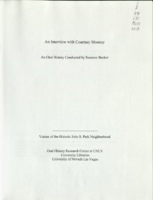
Transcript of interview with Courtney Mooney by Suzanne Becker, July 30, 2007
Date
Archival Collection
Description
Courtney Mooney is the Urban Design Coordinator for the City of Las Vegas. Her job description includes a knowledge of historic preservation, which is her passion. In this interview she shares her professional and personal thoughts about John S. Park Neighborhood. She moved to John S. Park in 2002. As a professional she explains that "how I look at preserving neighborhoods or buildings, is more of a community preservation, not saving the individual building for the individual building's sake..." Courtney offers a big picture of the neighborhood's past, present and future. John S. Park, like so many other Las Vegas neighborhoods, was built during World War II and has been affected by history of segregation and the wave of changing demographics, and the work that went into the plan and requirements to be designated a historic neighborhood. Courtney provides a summary of the story about the land, its ownership and what lead to the foundation of the neighborhood: from John S. Park to George Franklin and John Law, to Mary Dutton and explains how the proposed development of the land differed from other communities being built to FHA standards and specifics that declared Las Vegas a Defense City in the 1940s. She lists the factors that made the neighborhood a logical and important target for the historic designation, a small neighborhood tucked away, that is "a snapshot of the types of people that were coming here," filled with community leaders, entrepreneurs, blue-collar and casino workers. She also mentions about the missed opportunity of the Las Vegas High School neighborhood for preservation while supporting the John S. Park designation.
Text
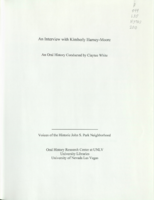
Transcript of interview with Kimberly Harney-Moore by Claytee White, June 16, 2010
Date
Archival Collection
Description
Kimberly Harney-Moore and her three siblings were raised in the John S. Park Neighborhood in the 1960s and 1970s. Their parents, Tim and Kathleen Hamey, were educators. A nostalgic feeling for the neighborhood remains; perhaps, rekindled when she had close friends buy a house across the street from her childhood home. In this interview, Kimberly talks about the inviting character of the area's architecture, mentions a few names of neighbors she babysat for, and fondly recalls her job at Luv-Its Custard shop. There was a time when she would drive through the old neighborhood and be saddened by the lack of upkeep and the changes, but today it is a place being reborn to a new generation. Note: Tim Harney and Kathleen Harney, Kimberly parents, are also participants in the Voice of the Historic John S. Park Neighborhood oral history project.
Text

Transcript of interview with Raymonde Fiol by Barbara Tabach, August 12, 2015
Date
Archival Collection
Description
In this interview, Fiol discusses her experience as a a hidden child in the Holocaust and her family's history. She also talks about her involvement with the Las Vegas Holocaust survivors group.
Raymonde "Ray" Fiol is president of the Holocaust Survivors Group of Southern Nevada. A Jewish Holocaust survivor whose parents were killed in Auschwitz, Fiol was hidden by a Christian family of Resistance fighters during her childhood in Nazi-occupied Paris, France. She married American serviceman Phil Fiol and left Paris in 1957. The couple lived in New York City where she worked in inventory control. She retired to Las Vegas, Nevada around 2003 and became active in the local Holocaust Survivors Group. In 2007, she became president of the organization, which provides essential services to Holocaust survivors and helps them share their stories. Fiol is also a member of the Nevada Governor?s Advisory Council on Education Relating to the Holocaust and the coordinating council of Shoah International. Her dedication to preserving the memory of the Holocaust and caring for survivors earned her the Nevada Senior Citizen of the Year award from the Nevada Delegation of the National Silver Haired Congress and the Aging Services Directors Organization in 2014, and in 2013 she was named Mensch Volunteer of the Year by the Jewish Federation of Las Vegas. In this interview, Ray reflects upon her traumatic childhood experiences, and shares how she learned details of her family?s history from a woman in France who had researched the destiny of the local Jewish community. She also discusses her involvement with the survivors group, and the positive impacts of its outreach activities, as well as goals to ensure future generations learn about, and from, the Holocaust.
Text

Transcript of interview with Michael S. Mack by Claytee White, May 21, 2009
Date
Archival Collection
Description
During this interview, Michael Mack visualizes his childhood memories of the later 1930s, when Las Vegas was a small, but steadily growing, desert town. As he says, "The desert was our backyard." The Strip hotels like the last Frontier and the Flamingo pop into the stories, but it was basically an innocent time. He attended John S. Park Elementary when classrooms were temporary buildings from the local Air Force base and the neighborhood was filled with children. He still maintains close friendships from that time. And he also recalls friends from the Westside neighborhood. Michael talks of scouting, riding horses, and watching Helldorado parades.
Michael Mack's first recollection of Las Vegas is as a two-year-old living in a duplex on Bonneville Ave. Though the family moved several times, they remained in or near the John S. Park neighborhood. Michael's father was a Polish immigrant who arrived in Boulder City, where he opened a shoe store, in 1932. The building of the Hoover Dam brought opportunities and his father Louis expanded into the salvage business. In time Louis moved the family to Las Vegas, opened a retail clothing store, which eventually sold uniforms, and set up the first local bail bondman office. During this interview, Michael visualizes his childhood memories of the later 1930s, when Las Vegas was a small, but steadily growing, desert town. As he says, "The desert was our backyard." The Strip hotels like the last Frontier and the Flamingo pop into the stories, but it was basically an innocent time. He attended John S. Park Elementary when classrooms were temporary buildings from the local Air Force base and the neighborhood was filled with children. He still maintains close friendships from that time. And he also recalls friends from the Westside neighborhood. Michael talks of scouting, riding horses, and watching Helldorado parades. Though the Macks were a Jewish family, Michael's mother always brought the Christmas tree to school. It was a period when people memorized each other's 3-digit phone numbers, went to movies for 14 cents, and there was a ranch for people to stay while getting divorced. Halloween Trick-or-treaters in the John S. Park neighborhood might get a tasty cupcake or a shiny dime. Michael has a plethora of stories about innocent mischief and the unique experiences of a boy growing up in Las Vegas.
Text

Transcript of interview with Arne Rosencrantz by Claytee White, February 9, 2010
Date
Archival Collection
Description
In this interview, focused on the John S. Park neighborhood of Las Vegas, Arne Rosencrantz discusses his childhood growing up in Las Vegas. He talks about local businesses, including his father's furniture store, as well as schools and churches in the neighborhood.
Arne Rosencrantz remembers living on Beverly Way from 1954 to 1970. Like so many others from that era, he attended Fifth Street School, John S. Park Elementary School, John C. Fremont Middle School and graduated from Las Vegas High School. As a Jew, he was in a small minority, but fondly recalls growing up in the dense Mormon population of John S. Park Neighborhood. As a youngster, life in Las Vegas was filled with fun. The desert provided opportunity to hunt lizards and rabbits. Kids walked to school without concern. They played ball and found the Strip casinos welcoming to locals. He tells how the social issue of segregation of the 1960s did not affect him personally, but how local movie theatre owner Lloyd Katz fought to make his Huntridge and Fremont theatres integrated. He also reminisces about his father opening Hollywood Furniture and later Garrett's Furniture, which Arne operated until retiring in 2001. During the interview, he lists other furniture companies and the strong assortment of other retailers and restaurants that served the neighborhood.
Text

Transcript of interview with Vincent "Vince" Hart by Andrew Bannister, February 21, 1980
Date
Archival Collection
Description
On February 21, 1980, Andrew Bannister interviewed Vincent “Vince” Hart (born on July 7, 1945 in Jerusalem, Palestine) in Hart’s office about his experience with youth soccer, both as a coach and as a player. Hart discusses his family background and his residential history in the United Kingdom and the United States before explaining the development of the men’s soccer team at the University of Nevada, Las Vegas. He describes his impact on the program and his hopes for future student athletes. The two then delve into a discussion of the fundamentals of soccer and different strategies that are commonly used. They then conclude with a brief description of Vince’s experiences with meeting a variety of professional soccer players at the Las Vegas Stadium.
Text
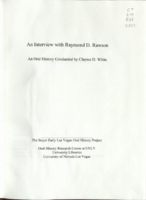
Transcript of interview with Dr. Ray and Linda Rawson by Claytee White, October 30, 2009 and November 13, 2009
Date
Archival Collection
Description
Raymond Rawson's life started in the rural Utah community of Sandy in 1940. His family moved around in what he describes as a scene from John Steinbeck's The Grapes of Wrath. By the age of 10, the family settled in Las Vegas, which had a population of around 35,000. He attended Fifth Street Grammar School, Las Vegas High School, was a member of UNLV's first graduating class, and eventually became a dentist. In this interview, he reflects on his experiences of growing up in Las Vegas, the hardships of difficult economic eras, and his professional accomplishments in the field of dentistry, including actively advocating the creation of UNLV School of Dental Medicine. Ray also became a community leader. He served in the Nevada State Legislature from 1985 to 2001. He talks about his relationship with long-time legislator Joe Neal. Education and access to healthcare were among the issues that Ray championed and he shares his observations of these issues. In 2009, he was appointe
Text
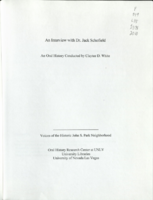
Transcript of interview with Dr. Jack Lund Schofield by Suzanne Becker, January 13, 2009
Date
Archival Collection
Description
In the dusty border town of Douglas, Arizona, Dr. Jack Lund Schofield was born in the family home in 1923. Due to the economic woes of the Great Depression, the Schofield family moved several times until 1937—the year that Jack's father took a position as a tungsten broker and moved his family of five children to Nevada. For Jack, who was ready to start high school, the move from Phoenix to Las Vegas with a small population of 5000 was a shock. However, it did not take the gregarious Jack long to make friends at Las Vegas High School. He played sports and was a Golden Glove boxing champion. As Jack's high school years drew to an end, two major events occurred: he met his future wife and World War II began. He proudly highlights his service as a fighter pilot in both WWII and the Korea conflict, his family genealogy, and his devotion to being an excellent educator, businessman, family man, and politician. In 1995, he earned his doctorate in education at the age of 72. His resume includes being an elected official, serving on the Board of Regents and having a middle school named after him. Jack and his wife, Alene, have resided in the John S. Park Neighborhood for over 50 years and describes his affection for the neighborhood and some of the changes that have occurred.
Text
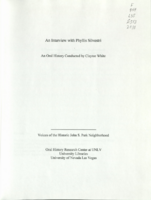
Transcript of interview with Phyllis Silvestri by Claytee White, January 11, 2010
Date
Archival Collection
Description
As a young woman, Phyllis Silvestri made the adventurous decision to move to the United States. She was bom in Canada and lived there until her early 20s. Over the next few years, Phyllis and her friend Mona logged many miles, worked and visited several states. By 1953, Phyllis had met and married Vincent Silvestri, who worked at Bingo Palace, now the Sahara Hotel and Casino. Soon they had their first child and had bought a home on Santa Rosa. A few years later they were building a new home in the John S. Park area. She proudly recalls her husband's attention to details such as including lots of built-in features and a bomb shelter that represents the era. Phyllis talks fondly of the neighborhood, but also recalls her children not being allowed to play with some of the neighborhood children because they were of Italian ancestry.
Text

Transcript of interview with Jack Levine by Suzanne Becker, June 28, 2007
Date
Archival Collection
Description
Jack LeVine offers a narrative as a real estate agent and a gay man who has lived in Las Vegas since he was a young adult in the 1980s. He first started visiting Las Vegas whenever his truck driver routes allowed him to visit his parents who had moved here in 1977. They owned a downtown sandwich and catering business called Your Place or Mine. Then in 1985 Jack and his life-partner, J.J., decided to relocate to Las Vegas. Jack soon launched a real estate career that began with the purchase of a 13-unit apartment complex. Over the years he became knowledgeable about the history of the greater community and the individual neighborhoods; including John S. Park—"the earliest suburb in Las Vegas. Jack and J.J have lived in a 1954 Mid-Century Modern home since the mid-1990s. Jack is a strong believer in re-gentrification and mentions other cities where this has been successful. His philosophy includes an explanation of the sense of community that is derived from those who invest of themselves in that community life John S. Park.
Text
